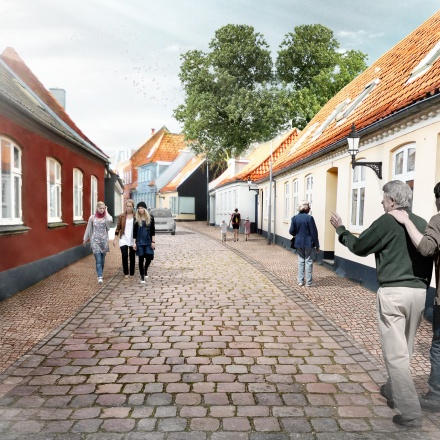Dementia-friendly public spaces
Solutions are, of course, comprehensively explored on how to assist people with dementia to live more comfortable lives at home for longer. Keeping sufferers happy within their four walls, however, is not the only answer and finding ways to help them venture further afield is also important.
Recent statistics from Alzheimer’s Research UK reveal that by 2040 the number of people expected to have dementia is to quadruple, with 59,199 to 219,409 more people needing palliative care from the disease. Finland, Sweden, Denmark rank above the UK on the list of countries that have the highest rate of deaths from dementia, with Belgium and the Netherlands even higher. Dementia, and the quality of care available for sufferers, is very much a European and worldwide crisis.
Already, we are seeing the needs of people with dementia directly influencing the design, function and use of residential homes. The AAL Programme in particular is a programme that is seeing the solutions and products it funds develop commercially for healthy and active ageing at home, and those solutions include many for those with dementia. Serious games, for example, are being developed to act as intervention tools and provide positive stimulation for sufferers by increasing their awareness and assisting with the carrying out of simple, everyday tasks. Meanwhile, smart technologies – such as apps and sensors – are also establishing themselves in the market, offering successful monitoring systems to friends and family of ageing loved ones to help detect early signs of dementia. Sensara is one such product to have emerged from an AAL project and it now offers, commercially, this exact type of tech solution for the ageing population.
Although these indoor developments are beginning to lead to radical changes in the lives of people with dementia and their friends, family and carers, there is still much to be done to complete the range of care solutions available. What happens to the state or quality of care for early-stage dementia sufferers who still want to live normal lives by popping to the shops or to the park, or for the more long-term patients who walk or wander outside? And with more of us likely to suffer from dementia than ever before, why are we restricting ourselves to living indoor lives by almost completely neglecting the accessibility of public spaces and amenities?
Society, universally, has already created a model that politicises disabilities as an issue and therefore, public spaces have been built and adapted to ensure they do not restrict or prevent individuals using them. The rights of people with dementia have been less strongly championed, with many environments such as shopping centres, parks, and cafes appearing disorienting, frightening and consequently unavailable for them to use.
In 2016, Natural England carried out a study with people living with dementia in a part of London, to find out how they engage with the natural environment. It revealed some interesting results:
- Only 20% of the people living with dementia cited their dementia as a barrier to using outdoor spaces
- 38% of sufferers cited informal walking as the most common activity
- 45% people with dementia found water to be the most popular place to visit whilst two thirds liked living less than one mile away from a park or public garden
The survey looked at how public transport hindered a person with dementia engaging with public spaces, but also at how the lack of awareness and information reaching dementia patients and their carers was a factor as to why some spaces were underused. One major issues arose around the availability of accessible signage, toilets, cafes, help points, relaxing places to sit where the ground is even, and having the knowledge that someone nearby is trained in dementia awareness.
In Denmark, as part of their national plan to make the country dementia-friendly by 2025, they are already looking at interventions to be incorporated into society to reduce the risk associated with wandering or using outdoor spaces. Recently, the country’s first village for dementia sufferers was created. Whilst there are some who argue that dedicated dementia villages may be too extreme and be seen as an out-of-sight, out-of-mind policy, Denmark believes the village with its fitness centre, support network and cooking classes, ensures its residents enjoy a more fun and secure existence.
From the segregated to the integrated, Varde Kommen municipality in Denmark is another aspect of the country’s 2025 plan. The town authorities have collaborated with the Dementia Alliance to become one of the country’s first dementia-friendly towns that aims to showcase a society with institutions that are inclusive and safe for dementia patients and their relatives. There are six such town schemes planned.
Surrounded by both the Wadden Sea National Park and the Danish North Sea National Park, dementia sufferers in Varde Kommen have that close connection with the natural environment that studies have revealed is so important. Furthermore, clubs have been started for early-onset sufferers and their relatives to attend and take part in activities, use gym equipment, garden, and play board games. Companies and associations have even been offered lessons to become dementia friendly.
As Denmark’s municipalities continue to positively assimilate, experts aim to understand the challenges people with dementia face on the local level, with the goal of strengthening existing visions and strategies with new knowledge and innovation in order to find the necessary long-term solutions.
In Varde Kommen, the town’s project manager along with other professionals, are working with the AAL in the process of designing and adapting dementia-friendly public spaces. As such, the AAL community is beginning to look beyond just tech solutions for the home, but at creating public spaces that ensure a high level of safety and security for people with dementia by using highly intelligent infrastructure and state-of-the-art communication and sensory technologies..
In very much the same way that many of the current AAL products operate, these outdoor solutions are being embedded in existing infrastructures within the urban landscape. To ensure the best approach is taken, AAL will be exploring topics that include meaningful and targeted interaction between people with dementia, public space designs and technology, stakeholder motivation and commitment, legislation issues, data privacy vs. effectiveness, and its sustainability.
Research conducted by AAL projects underlines a committed step towards understanding how people with dementia use, and want to use public spaces, and how tech solutions can help them to do so. There is a clear need to develop this approach further and look at solutions that enable people with dementia, of all levels, to continue living their lives safely not just inside their homes, but with the freedom to use spaces outdoors as unhindered as possible. Meanwhile, as dementia continues affect more and more people around the world, awareness needs to be increased on how vital dementia-friendly public spaces are for the wellbeing of both sufferers and their careers.

